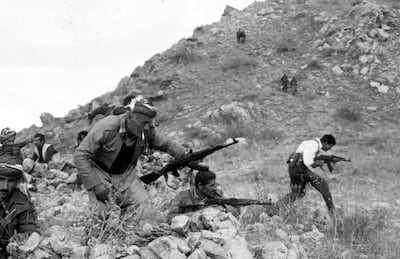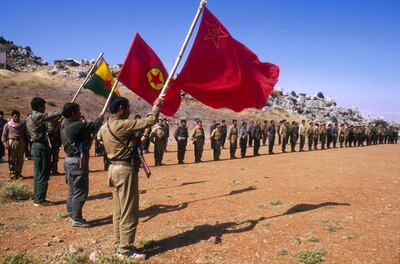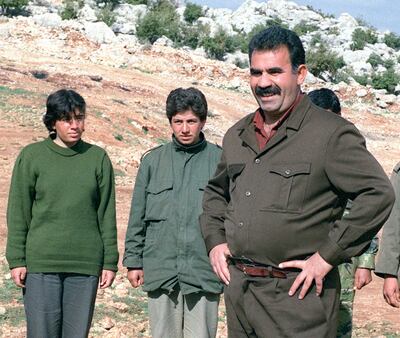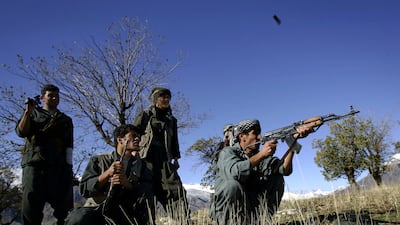The decades-long conflict between Turkey and the rebellious Kurdistan Workers' Party (PKK) pits NATO's second-largest military against a rebel force that claims to seek the independence of Kurds but is designated a terrorist organisation by Ankara, the EU, and the US.
The conflict has largely shifted to the mountains of Iraqi Kurdistan across the Turkish border, where Turkey has intensified its air strikes against the PKK in recent years, therefore restricting the movement of the rebels who have been forced back into tunnels and caves.
The PKK, established in 1978, has had a long, complicated and tenuous relationship with the authorities of Iraqi Kurdistan during the four decades the Kurdish group has been active in the region, mainly since 1984 when it launched its insurgency against Turkey.
The Kurdistan Democratic Party (KDP), the largest and most powerful political force in the autonomous regional government, has taken a much firmer stance against the PKK than its ruling partner, the Patriotic Union of Kurdistan (PUK).
According to a senior official in the Kurdistan Regional Government (KRG) and the KDP, there is no sign of that stance softening.

“The stand of the KRG is very clear … any militants, any armed groups not under the security apparatus of the state of Iraq or the KRG are considered [outside] the law,” Dr Dindar Zebari, the KRG’s co-ordinator for international advocacy, told The National.
The PKK is "an outlaw organization, existing in the region and in the border areas, to accommodate itself," he said from his office in Erbil.
Wars have been fought between KDP forces and the PKK, and the former is open about its desire for the latter to leave and move its conflict elsewhere, especially after Iraq’s National Security Council banned this month the separatist party ahead of meetings between senior officials from Iraq and Turkey in Baghdad.
Turkish and Iraqi officials, including the ministers of foreign affairs, stressed in a joint statement after the meetings that "the PKK organization represents a security threat to both Turkey and Iraq, and it is certain that the presence of this organization on the Iraqi territory represents a violation of the Iraqi constitution".

According to the statement, Turkey "welcomed the Iraqi National Security Council’s decision to consider the PKK a banned organization in Iraq, and the two sides consulted on the measures to be taken against the organization and its banned extensions that target Turkey through Iraq’s territory".
Turkey's cross-border military operations into Syria and northern Iraq against Kurdish militants following deadly attacks carried out by various militant groups between 2015 and 2017 in Turkish cities that left more than 500 dead.
For Dr Zebari, the PKK "should not have a place of activity in Iraqi Kurdistan, using it as a base for any military confrontation. This is very much rejected. This has been our call for years".
“We have so far had nine cabinets in the Kurdistan region through a peaceful transfer of power. So the PKK should not claim ownership and it should not claim the representation of the Kurdish people in the Kurdistan Region."
Yet for the insurgents, the conflict will persist.
The PKK spokesman Zagros Hiwa, who has been a member of for more than two decades, told The National that the fundamental aim of his group is to "defend the democratic and national rights of the Kurdish people," and to find "a solution to the Kurdish question in Turkey, through democratic and political means".
Turkey categorizes the PKK as a terrorist organization, a view shared by the United States, NATO, and the European Union. This classification is based on the PKK's long history of armed conflict against the Turkish state, including attacks on military, police forces, and civilians, which have resulted in tens of thousands of deaths over the decades.
Approximately thirty million Kurds live in the Middle East, mainly in Iran, Iraq, Syria, and Turkey where they make up nearly one-fifth of its population of seventy-nine million. They are one of the world’s largest peoples without a state.
Conflict with Turkey
The Turkish military is the Nato's second-largest after the US, equipped with advanced technology and vast manpower. On the other hand, the guerrilla group based in the mountains of Iraqi Kurdistan relies mainly on light weapons and bombings.
The PKK's activities are seen as a threat to Turkey's national unity and territorial integrity. Turkey accuses the PKK of attempting to create an independent Kurdish state or gain significant autonomy for Kurds within Turkey, which Ankara views as a direct challenge to its sovereignty.
In recent months, a series of Turkish air strikes on the group's positions killed dozens of PKK fighters in Syria and Iraq. In August alone, Turkey carried out 113 attacks, killing 10 PKK members, Mr Hiwa said.
The spokesman noted the increase in Turkish attacks since 2015. He said Ankara had set up more than 100 military posts in Iraqi Kurdistan.
For the group to consider dropping its weapons, a number of objectives must be met, Mr Hiwa explained. Top of their demands is the release of their leader Abdullah Ocalan – also known as Apo – who has been detained in a highly secure jail in Turkey since 1999. Turkey charged Ocalan with treason and separatism.

Mr Hiwa stressed that several other conditions must be met as well.
"First and foremost, the Turkish state must stop using the language of weapons against the Kurdish people, should recognise the identity of the Kurds as equal and free citizens of the state of Turkey – their identity should be recognised formally, constitutionally and they should enjoy their own political, cultural and social rights within Turkey."
Military operations in "northern and southern Kurdistan" should be stopped, he added, referring to Kurdish -majority areas in Turkey and Iraq.
He also called for the release of the PKK prisoners from Turkish jails.
The Turkish government media office didn't respond to requests for comment, however Turkey has long held a critical position of PKK demands so long as it refuses to give up armed resistance.
Meeting those conditions seems a long way off as numerous ceasefires have broken down. The most recent was last year amid an earthquake that killed more than 50,000 people in Turkey but lasted only a handful of months.
"We have been resisting these attacks for the last 40 years and if these attacks continue – it seems they will continue – we are ready to resist; we are determined to resist another 40 years", the PKK official said.
Disagreements between the PKK and authorities in the region have revolved mainly around the means of delivering the needs of the 30 million Kurds.
“Yes, we do support the aspirations of the Kurds in Turkey, in Syria, in Iran," said Dr Zebari. "But we support the civilian process, which is dialogue, elections, civilian activities … through the political process."
The autonomous region with its government is considered the most successful representation of the Kurds in the region. They have been severely repressed in Turkey and Iran, while in neighbouring Syria – amid the chaos of the brutal 13-year civil war – the Kurds have had some success, although the close link between the regional Kurdish administration there and the PKK has prompted increased pressure from Turkey.
“We do not believe that any sort of military confrontation will be for the benefit of any nation around the Middle East.
“It is time that this process goes through peaceful dialogue. And through public pressure to make these changes happen. And I think the ballots are the way forward as we have seen lately in Turkey,” he said in reference to the elections in Turkey last year.
Further complicating the situation is the close relationship between Turkey and the KRG. Dr Zebari described it as a “very strategic, important and significant relationship”, and referred to the support Turkey offered the Kurds of Iraq during the reign of Saddam Hussein, who repressed the Kurdish people brutally.
“Turkey has been active in terms of the reconstruction of Kurdistan and bringing in the basic infrastructure in Kurdistan region,” he said.
“It has also been a channel of communication as well as transportation from Kurdistan to the outside world, especially to Europe. So Turkey is a significant partner."
Governance in Iraqi Kurdistan has not always been easy. The KDP has an extremely tenuous relationship with its junior ruling partner, the PUK, which has been seen at times as supportive of the PKK.
Dr Zebari emphasised that no group or individual should inflict damage on the Kurdistan region of Iraq and its self-governance.
“You should not diminish the role of the KRG in its own territories. You should leave the people of Iraqi Kurdistan to move fully and freely return to their own original places,” he said in reference to the thousands of people who have been displaced from their villages bordering Turkey in recent decades by the conflict between the PKK and Ankara.
The best way for the PKK to obtain its freedom and rights was through “dialogue and peaceful participation”, he said.


